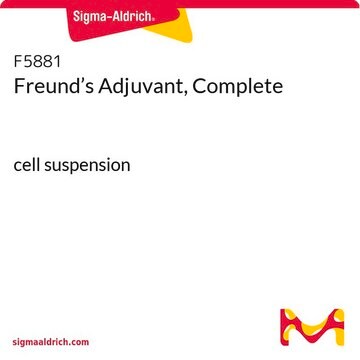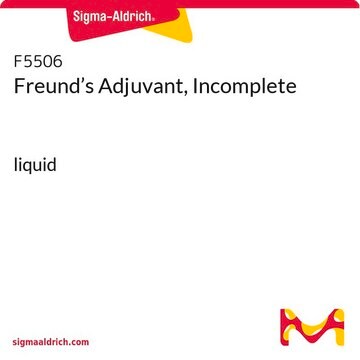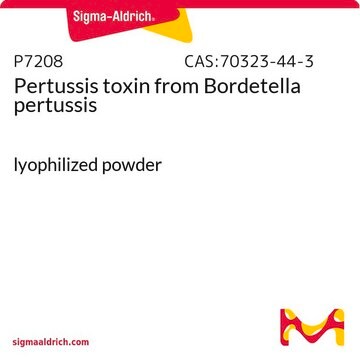Recommended Products
biological source
bovine
Quality Level
form
powder
origin
USA origin
technique(s)
affinity chromatography: suitable
fractionation: suitable
impurities
≤10% water (Karl Fischer)
UniProt accession no.
storage temp.
2-8°C
Gene Information
bovine ... ALB(280717)
Looking for similar products? Visit Product Comparison Guide
Application
Albumin methylated from bovine serum (mBSA) has been used as a coating for immunoplates in enzyme-linked immunosorbent assay (ELISA) of anti-dsDNA IgG antibodies. It has also been used to induce arthritis in mice models.
As an affinity ligand on diatomaceous earth support (MAK chromatography), a medium for fractionation of different forms of DNA and for separating aminoacyl-tRNAs. Different modes of binding of double-stranded, denatured, and replicating forms of DNA account for the efficacy of the method.
Biochem/physiol Actions
Albumin is a major circulating component of the plasma and is a highly soluble multifunctional protein. It plays a role in several physiological and pharmacological processes. Albumin binds to metals, cholesterol, hormones, bile pigments, drugs, and fatty acids to facilitate their transport. It regulates osmotic pressure and distributes fluids between various compartments.
Preparation Note
Methyl ester of albumin prepared per Mandell, J.D. and Hershey, A.D., Anal. Biochem., 1, 66 (1960).
Storage Class Code
11 - Combustible Solids
WGK
WGK 3
Flash Point(F)
Not applicable
Flash Point(C)
Not applicable
Personal Protective Equipment
dust mask type N95 (US), Eyeshields, Gloves
Choose from one of the most recent versions:
Certificates of Analysis (COA)
Lot/Batch Number
Don't see the Right Version?
If you require a particular version, you can look up a specific certificate by the Lot or Batch number.
Already Own This Product?
Find documentation for the products that you have recently purchased in the Document Library.
Customers Also Viewed
Kaoru Yamagata et al.
Clinical and experimental rheumatology, 38(4), 670-679 (2019-11-07)
Although articular cartilage contributes to smooth joint motion, once damaged this functionality cannot be recovered. Activation of the IL-6/STAT3 signalling pathway contributes to chondrogenic differentiation of mesenchymal stem cells (MSCs), indicating a role for soluble IL-6R (sIL-6R) during chondrogenesis in
Mohammad Haque et al.
Scientific reports, 6, 20588-20588 (2016-02-06)
Pluripotent stem cells (PSCs) have the potential to produce almost all of the cells in the body, including regulatory T cells (Tregs). However, the exact conditions required for the development of antigen (Ag)-specific Tregs from PSCs (i.e., PSC-Tregs) are not
Fractionation of amino acyl-acceptor RNA on a methylated albumin column.
N SUEOKA et al.
Proceedings of the National Academy of Sciences of the United States of America, 48, 1454-1461 (1962-08-01)
Ayaka Sato et al.
Biological & pharmaceutical bulletin, 45(12), 1798-1804 (2022-12-01)
OX40, a member of the tumor necrosis factor (TNF) receptor superfamily, is induced on activated T cells. Membrane-bound OX40 ligand (OX40L) expressed by activated antigen-presenting cells induces OX40 signaling, which promotes T cell immunity. OX40 agonism would be a potential
David L Mitchell
Methods in molecular biology (Clifton, N.J.), 314, 239-249 (2006-05-06)
Over the past 20 yr, the use of polyclonal and monoclonal antibodies to quantify damage in DNA has burgeoned. Immunoassays offer distinct advantages over other anaytical procedures currently used to measure DNA damage including adaptability, sensitivity and selectivity. This combination
Our team of scientists has experience in all areas of research including Life Science, Material Science, Chemical Synthesis, Chromatography, Analytical and many others.
Contact Technical Service





